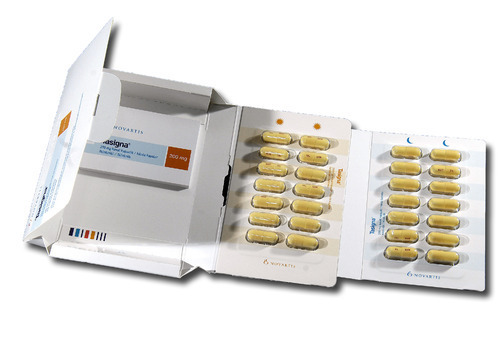Product Description
Tasigna in the form of the hydrochloride monohydrate salt, is a small molecule tyrosine kinase inhibitor approved for the treatment of -resistant chronic myelogenous leukemia. Medical usesCrystal structure of Abl kinase domain(blue) in complex with nilotinib (red)It is FDA- (29 October 2007), EMA- (29 September 2009), MHRA- (19 November 2007) and TGA- (17 January 2008) approved for use as a treatment for Philadelphia Chromosome (Ph+)-positive Chronic myelogenous leukaemia. In June 2006, a Phase I clinical trial found nilotinib has a relatively favorable safety profile and shows activity in cases of CML resistant to treatment with , another tyrosine kinase inhibitor currently used as a first-line treatment. In that study 92% of patients (already resistant or unresponsive to ) achieved normal white blood cell counts after five months of treatment. The drug carries a black box warning for possible heart complications. The use of low doses of nilotinib is being investigated for use for Parkinson's and Alzheimer's disease, as well as for ALS, dementia and Huntington's disease. Novartis announced on April 11, 2011 that it is discontinuing a Phase III trial of Tasigna® (nilotinib) for investigational use in the first-line treatment of gastrointestinal stromal tumor (GIST) based on the recommendation of an independent data monitoring committee. Interim results showed Tasigna is unlikely to demonstrate superiority compared to Novartis's Glivec® ()*, the current standard of care in this setting.Contraindications Contraindications include long QT syndrome, hypokalaemia, hypomagnesaemia, pregnancy, planned pregnancy, lactation and galactose /lactose intolerance.Cautions include:

